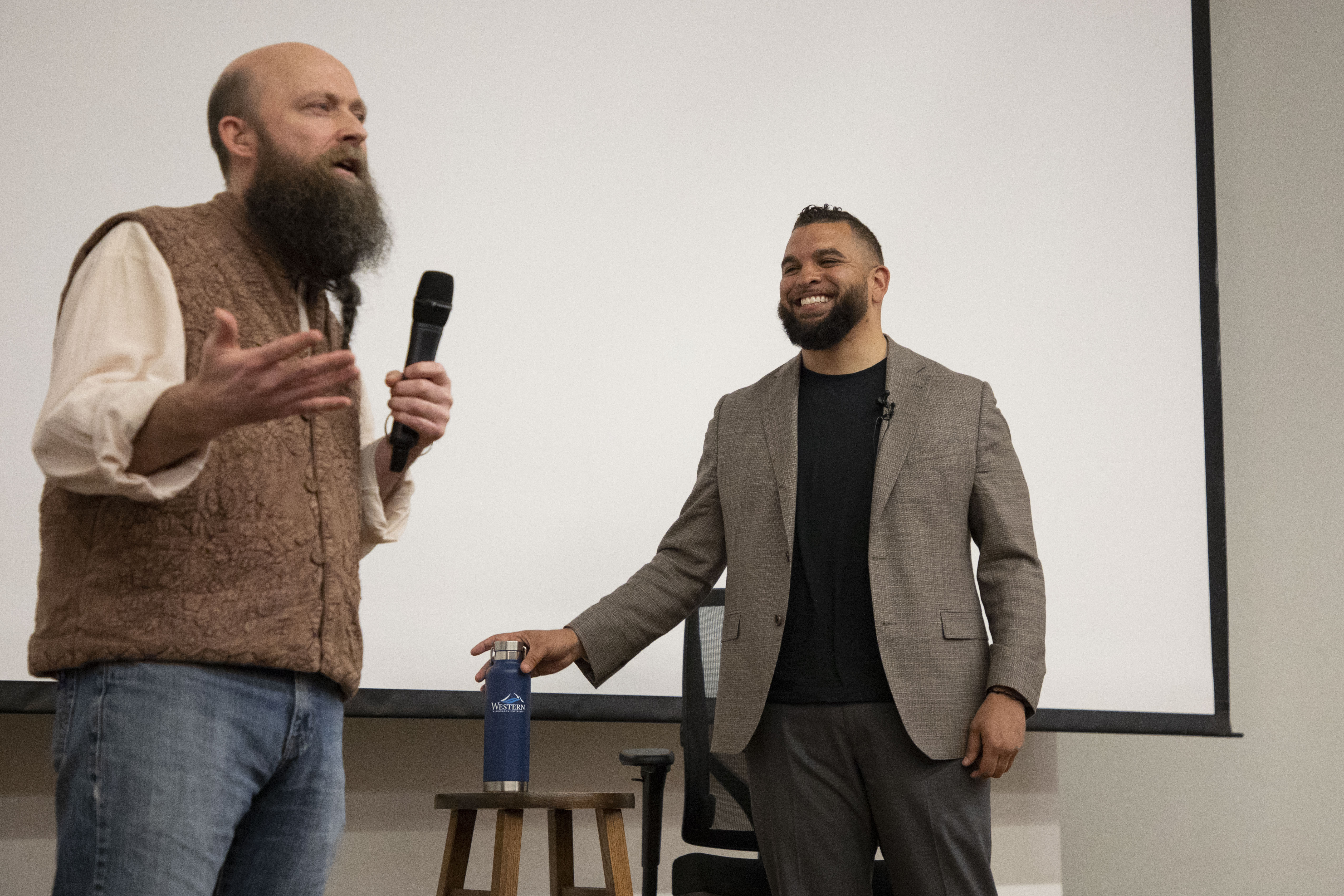Professor Korey Harvey moderated the conversation with Jesse Moore, asking him questions about his career, accomplishments and advice he would give to college students entering the workforce. Harvey and Moore have worked together on projects in the past. Ella Banken // AS Review
By Charlene Davatos
Jesse Moore, former White House speech writer and founder of Common Thread Strategies, visited Western April 22-26. Moore graduated from Western in 2005 and is the first speaker in Western’s annual Alumni-in-Residence program.
The Karen W. Morse Institute for Leadership and the Ralph Munro Institute for Civic Education sponsored Moore’s visit of classrooms, forums with the political science department and his keynote presentation, Courageous Conversations, as well as his visit to the Black Student Union.
Vernon Johnson, director of the Munro Institute, said that the Munro Institute and Morse Institute chose Moore due to the campus’ ease of access to him. He’d visited Western several times to speak, most recently in 2017.
“I think we knew about what his message would be,” Johnson said. “We thought it’d be very timely for where the country and where the campus are right now.”
Moore stated that he was glad to be back at Western, as it was where he’d come of age as a leader, as Moore was AS VP for Diversity, as well as the Vice President of the BSU during his time here.
Moore’s message during Courageous Conversations revolved around student-submitted questions. One topic, which was brought up multiple times, was mental health. “I think it gets missed a lot,” Moore said. “We want to talk about career paths and goals, and it gets taken for granted that if you’re successful you’ll be happy.”
Moore also emphasized the importance of civil discourse during his presentation. He spoke about working with the New York Police Department in building trust within their community, specifically people of color. “Dignity matters, civility matters, not demonizing people who disagree with you matters,” Moore said.
Moore spoke about his experiences in the White House, stories about his time at Western and his hope for the younger generation. “Being here reminds me I have to surround myself with students every once in a while. The energy of you and the wisdom of you at such a young age is inspiring to me,” he said to the students.
During his forums with the political science department, students asked Moore questions concerning his career and how he came to working in the White House.
Samantha Zilly, a political science major, said that she came for advice. “I think a lot of people came to this event because they see someone who was in this political science department who made it in the real world,” Zilly said. “We’re all just trying to figure out what we’re doing with our degrees.”
Moore told his own story of how he started working for the Obama administration. He told an anecdote of how he started off sleeping in a tent before he started working for the White House. “I never would have thought I would have gone into politics. Even when I was political science major,” Moore said.
“Earn your stripes by working for an insane amount for little or no money. Be prepared to sleep in a basement somewhere,” he said.
Moore also visited political science classes, leadership classes and classrooms within the Bellingham Public Schools District. Karen Stout, director of the Morse Institute, invited Moore to speak in her Leadership Studies class. Mark Behee, a first-year student in Stout’s class, said that Moore spoke about dealing with toxic leaders and co-workers.
“Listening to Moore talk about leadership and how what he learned at Western impacted his career really struck a chord with me,” Behee said. “For the hour he had with us, the entire class was engaged with what he was saying.”
Moore concluded his week at Western with a visit to the BSU. He was asked by current members about his time in the BSU, working with the Ethnic Student Center, how Western is perceived outside of the state and how to have discussions with people who aren’t students of color.
When asked about campus climate, Moore said that the climate seems to have remained the same as when he attended Western. He said the issues that were in conversation on campus were mostly the same and that there was a similar divide. “I think you have higher expectations than we did, though. Which is a good thing.” Moore said.
Abdul Malik-Ford, current President of BSU, said that Moore inspired him. “Coming from a black student and a black alumni, someone who was AS VP for Diversity, is really big,” Ford said. “It’s black excellence at it’s finest.”
Khadijah Pritchett, the budget authority for BSU, said that Moore’s perspective felt both fresh and seasoned. “It’s so nice that he’s stayed so humble after working for Obama and celebrities. When he was talking about mental health, it really helped me. He’s a big political person, but he’s also very human,” Pritchett said.
Moore said that he hopes that he imparted a good message to the students at Western. “Even when you find professional success, you still have to get your life together, you have to make sure you’re pursuing your dreams and making sure that you’re impacting people,” Moore said.
Moore said that he’ll always consider Western home turf.
“I sat out and wrote for a client and read emails in Red Square for a while. No one recognized me. It’s interesting to come back to ground zero where I started feeling the fire in my belly,” Moore said.

